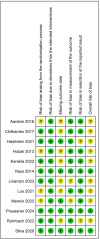Effectiveness of unguided internet-based computer self-help platforms for eating disorders (with or without an associated app): A systematic review
- PMID: 40267071
- PMCID: PMC12017517
- DOI: 10.1371/journal.pdig.0000684
Effectiveness of unguided internet-based computer self-help platforms for eating disorders (with or without an associated app): A systematic review
Abstract
Background: Following the COVID-19 pandemic, internet-based computer self-help platforms for eating disorders (EDs) became increasingly prevalent as a tool to effectively prevent and treat ED symptoms and related behaviours. This systematic review explored the effectiveness of unguided internet-based computer self-help platforms for EDs.
Methods: From inception to the 31st of May 2024, a systematic search of Ovid MEDLINE, Embase, Global Health, and APA PsycInfo was conducted. This systematic review followed the Preferred Reporting Items for Systematic Reviews and Meta-Analyses (PRISMA) guidelines. Outcome quality assessments were conducted according to the Grading of Recommendations Assessment, Development and Evaluation (GRADE).
Results: 12 RCTs, with a total of 3400 participants, were included. 2 studies explored the effectiveness as primary prevention, 7 as secondary prevention, and 3 as tertiary intervention. The gathered literature demonstrated unguided internet-based computer self-help platforms as effective in reducing ED core symptoms and related behaviours, with psychoeducation, cognitive behavioural, and dissonance-based approaches being the most prevalent approaches.
Conclusions: Unguided internet-based computer self-help platforms are effective in the short-term reduction of ED symptoms and associated behaviours and should be implemented in the early stages of a tiered healthcare system for ED treatments.
Trial registration: Prospero (CRD42024520866).
Copyright: © 2025 Gentile et al. This is an open access article distributed under the terms of the Creative Commons Attribution License, which permits unrestricted use, distribution, and reproduction in any medium, provided the original author and source are credited.
Conflict of interest statement
The authors have declared that no competing interests exist.
Figures
Similar articles
-
Effectiveness of Computer-Based Psychoeducational Self-Help Platforms for Eating Disorders (With or Without an Associated App): Protocol for a Systematic Review.JMIR Res Protoc. 2024 Nov 4;13:e60165. doi: 10.2196/60165. JMIR Res Protoc. 2024. PMID: 39495557 Free PMC article.
-
A comparison of the effectiveness of cognitive behavioural interventions based on delivery features for elevated symptoms of depression in adolescents: A systematic review.Campbell Syst Rev. 2024 Jan 7;20(1):e1376. doi: 10.1002/cl2.1376. eCollection 2024 Mar. Campbell Syst Rev. 2024. PMID: 38188230 Free PMC article. Review.
-
Efficacy and cost-effectiveness of Internet-based selective eating disorder prevention: study protocol for a randomized controlled trial within the ProHEAD Consortium.Trials. 2019 Jan 30;20(1):91. doi: 10.1186/s13063-018-3161-y. Trials. 2019. PMID: 30700318 Free PMC article.
-
Behavioural modification interventions for medically unexplained symptoms in primary care: systematic reviews and economic evaluation.Health Technol Assess. 2020 Sep;24(46):1-490. doi: 10.3310/hta24460. Health Technol Assess. 2020. PMID: 32975190 Free PMC article.
-
Internet-Delivered Cognitive Behavioural Therapy for Major Depression and Anxiety Disorders: A Health Technology Assessment.Ont Health Technol Assess Ser. 2019 Feb 19;19(6):1-199. eCollection 2019. Ont Health Technol Assess Ser. 2019. PMID: 30873251 Free PMC article.
References
LinkOut - more resources
Full Text Sources



